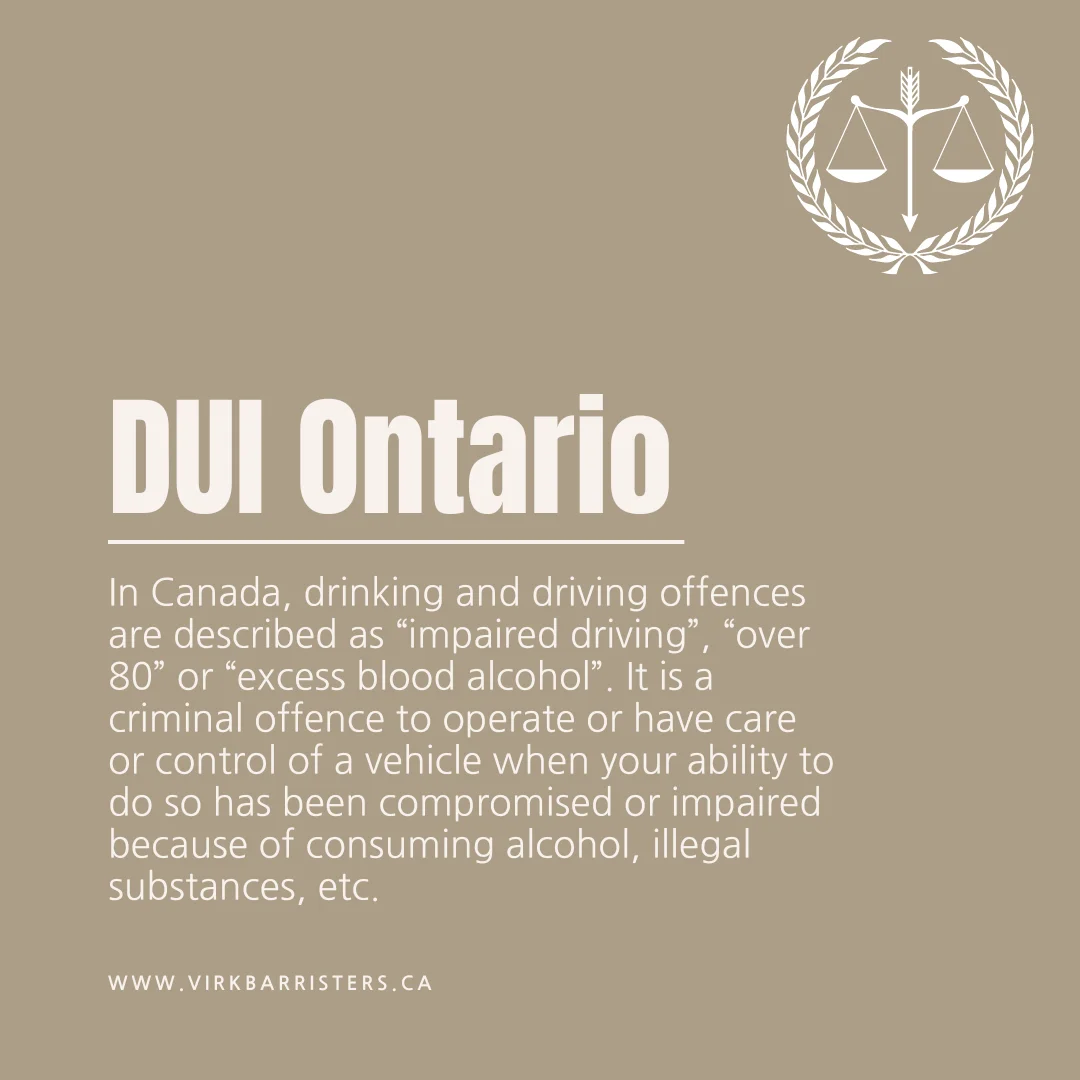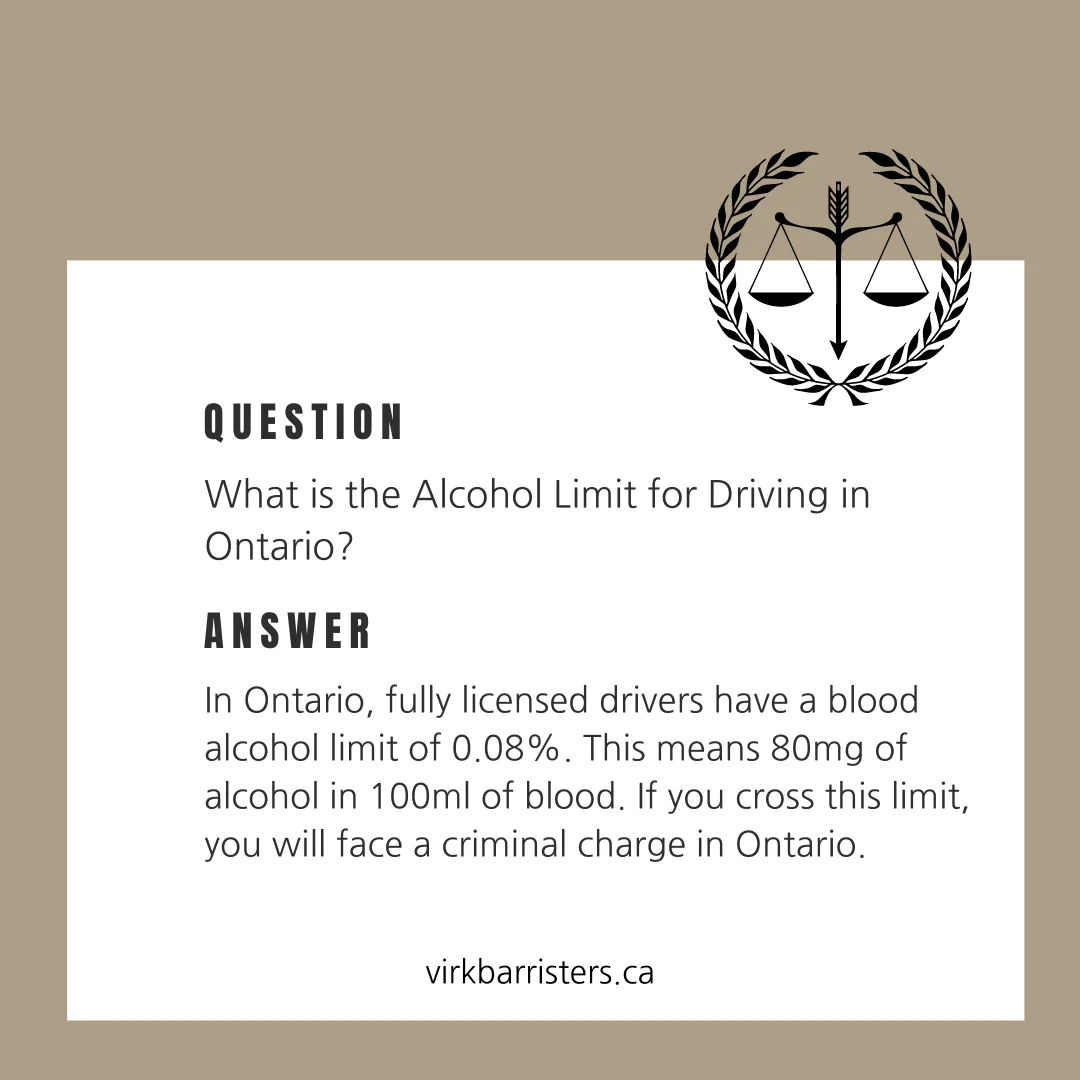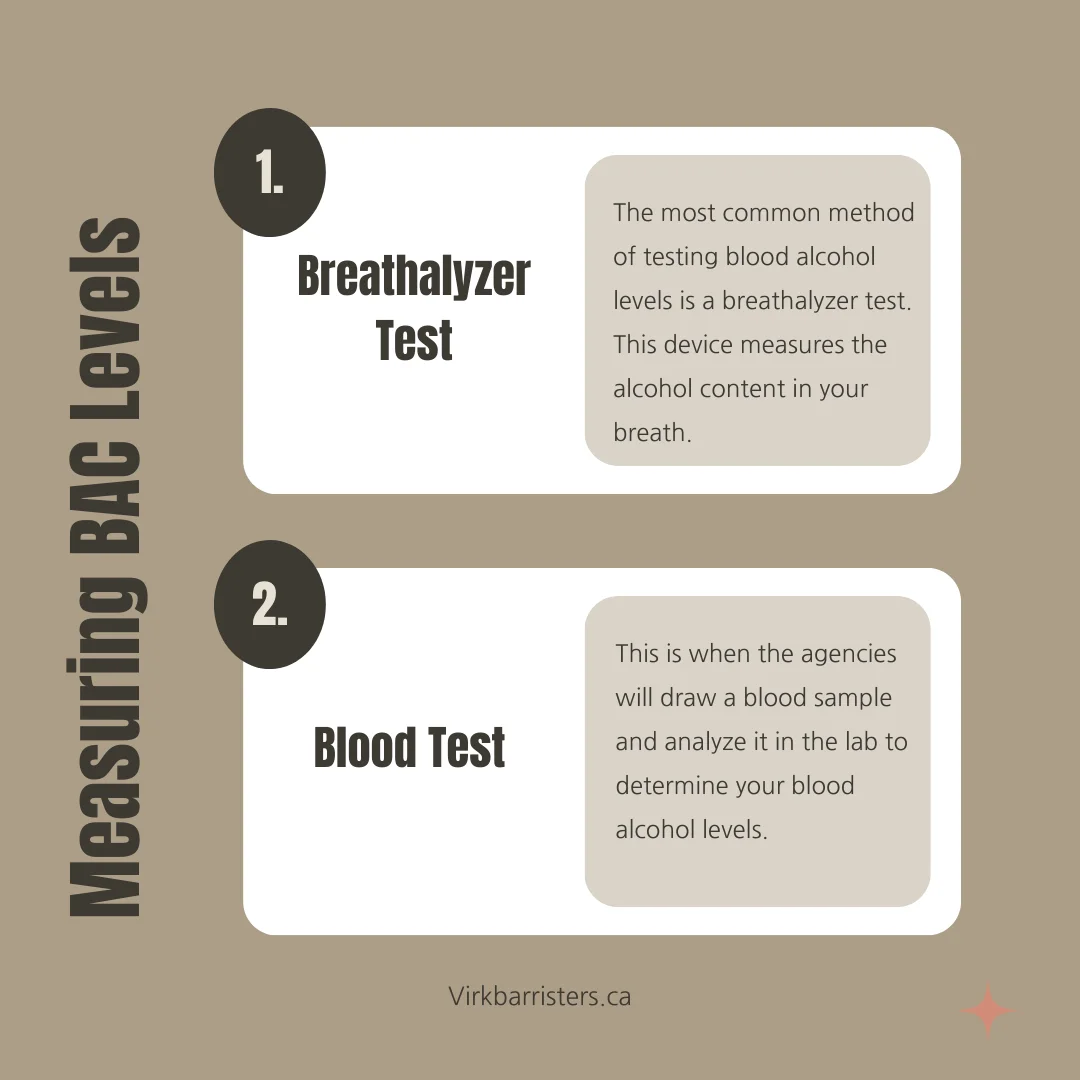What is the Alcohol Limit for Driving in Ontario?

In 2023,49 people passed away in Ontario because of alcohol or drug-related car crashes. This leads to thousands of impaired driving charges within the province and fatalities that could have easily been avoided.
One way to avoid being on the opposite side of the law is by familiarizing yourself with the alcohol limit for driving in Ontario. When you know these limits, you can practice substance consumption more precaution and safety.
To avoid an impaired driving charge, here is what you should know about the alcohol limit for driving in Ontario.
“DUI” Meaning in Ontario: An Overview

Driving under the influence is an American term that is often improperly used in Canada. In Canada, drinking and driving offences are described as “impaired driving”, “over 80” or “excess blood alcohol”. It is a criminal offence to operate or have care or control of a vehicle when your ability to do so has been compromised or impaired because of consuming:
- Alcohol
- Illegal substances
- Prescription medication or Over-The-Counter drugs
- Cannabis
- Or a combination of the above
Impaired driving laws apply to vehicles, snowmobiles, boats, electric scooters and more. If you get caught while driving impaired or over the legal limit, then you will face serious criminal charges and various penalties including a mandatory criminal record, fine and one year second prohibition on a first offence!
So, if you want to avoid this, it is best to know what is the alcohol limit for driving in Ontario.
Legal Alcohol Limit Ontario Age
If you are 21 years of age or younger, you can’t have any alcohol in your system when operating a motor vehicle. Ontario doesn’t tolerate drinking and driving from young drivers.
The legal age to consume alcohol in Ontario is 19. However, only when you are 21 and above, can you legally drink and drive as long as you stay within the legal alcohol limit for driving in Ontario.
What is the Alcohol Limit for Driving in Ontario?

In Ontario, fully licensed drivers have a blood alcohol limit of 0.08%. This means 80mg of alcohol in 100ml of blood.
If you cross this limit, you will face a criminal charge in Ontario. On the other hand, some officers can also penalize you for an alcohol level between 0.05 and 0.08%, as this is known as the “warm range”. Generally, your license is taken away for several days but no charges are laid and no insurance implications.
Because of this, it is crucial to stay below the legal alcohol limit in Ontario.
Factors that Affect the Blood Alcohol Levels
Please note that various factors can affect your blood alcohol levels. These levels vary between individuals, which is why it is important to stay well below the limit.
Here are the top factors that can affect your blood alcohol levels in Ontario:
- Gender: Women usually reach higher blood alcohol levels than men even after consuming the same amount. This is due to their metabolism and body composition.
- Metabolism: The way your body metabolizes alcohol will affect how long it will remain in your system, which will impact your blood alcohol levels.
- Weight: Typically, people with a low body weight may experience a higher blood alcohol level after consuming alcohol than people with a higher body weight.
- Food consumption: When you consume food before or while drinking alcohol, it can slow down your alcohol absorption levels, which leads to lower levels. On the other hand, if you drink on an empty stomach, your blood alcohol levels will rise due to rapid absorption.
These factors will affect how alcohol stays in your body, which will affect your blood alcohol levels. Because of this, it is best to stay on the safe side and stay way below the range so you don’t face any criminal charges.
Alcohol Limit for Driving in Ontario for Young and Novice Drivers
Ontario has a zero-tolerance policy for young and novice drivers with a G1, G2, M1, or M2 license or anyone aged 21 or below. If you fall under this category, you shouldn’t have any alcohol in your system while driving.
We will discuss the penalties for these drivers below under the penalties section.
The Ontario G License Alcohol Limit
If you are a G-class driver in Ontario, aged 21 and above, the national alcohol limit also applies to you. This means the Ontario G license alcohol limit for drivers aged 21 and above is also 0.08%.
However, you can also face penalties if you fall within the warn range. If you are guilty, it will lead to immediate license suspension or other penalties the state sees fit.
Alcohol Limit for Driving in Ontario for Commercial Drivers
If you drive a commercial vehicle between classes A and F or operate a road-building machine, you should have no alcohol in your system. Ontario has a zero-tolerance policy for commercial drivers.
Suppose you are operating a vehicle requiring licenses of A to F, a vehicle requiring a CVOR, or a road-building machine. In that case, you must not have any alcohol in your system while operating such commercial vehicles.
How Many Drinks Should You Consume in General?
After learning what the blood alcohol limit in Ontario and the factors that affect it, you might wonder how many drinks you can realistically drink and drive in Ontario.
According to the CAMH (Centre for Addiction and Mental Health) in Toronto and The Canadian Centre on Substance Use and Addiction, it is important to follow some guidelines.
These alcohol limits are primarily assigned based on the gender, which include the following:
- Men: Three drinks daily. Fifteen drinks weekly, and four drinks on one occasion.
- Women: Two drinks daily. Ten drinks weekly, and three drinks on one occasion.
If you are still not sure how much to drink, you can use the following guidelines from CAMH for reference to understand how many beers you can drink and drive in Ontario:
- 12oz of beer has an alcohol content of 5%
- 5oz of wine has an alcohol content between 10 and 12%
- 1.5oz of hard liquor has a 40% alcohol content
- 3oz of fortified wine has an alcohol content between 16 and 18%
It is important to note that while there are daily limits, it is still not recommended to drink daily. Instead, having a few days each week when you are not drinking is good to ensure it doesn’t become a habit.
How Law Enforcement Agencies Measure the Blood Alcohol Levels in Ontario

In Ontario, law enforcement agencies typically use two primary methods to calculate blood alcohol levels. These include the following:
1. Breathalyzer Test
The most common method of testing blood alcohol levels is a breathalyzer test. This device measures the alcohol content in your breath.
These results reflect how much alcohol content is currently in your bloodstream. Please note that refusing a breathalyzer test in Ontario can even result in legal consequences.
2. Blood Test
While this method is rare, it provides the most accurate result. This is when the agencies will draw a blood sample and analyze it in the lab to determine your blood alcohol levels.
Usually, agencies use this method when people refuse or dispute a breathalyzer test.
FAQs
How many drinks can you have and drive in Ontario?
The easy answer is have none and you’re safe. In Ontario, if you consume two beers and drive, it may put you close to the alcohol limit for driving in Ontario of 0.08%. However, if you are a young, novice, or commercial driver, you can’t have any drinks and drive.
How many drinks is 0.08 blood alcohol level?
Reaching a blood alcohol concentration takes between four and five drinks. However, this largely depends on how your body processes the alcohol.
How much alcohol is allowed while driving in Canada?
A blood alcohol level of 0.08 is allowed in Canada; if you fall within this range or more, you will face criminal charges and penalties.
Final Thoughts
Now that you know the alcohol limit for driving in Ontario, it is important to be careful. We recommend taking other drinking and driving alternatives or staying below the warm range.
If you are charged with crossing this limit, you can contact our impaired driving lawyer in Mississauga. Suny Virk will ensure you receive a fair and just outcome, depending on your case circumstances.
Author Profile

- Mr. Suny Virk is a reputable criminal defence lawyer in Mississauga focusing primarily on criminal law matters of clients. Mr. Virk has been awarded with the Certificate of Merit Award in Advocacy. Now, he wants to impart his knowledge and wisdom to other people who may be struggling with the Canadian legal system to serve his community.
Latest entries
 UncategorizedMarch 25, 2025Cybercrime In Canada: How Criminal Law Handles Internet Offences
UncategorizedMarch 25, 2025Cybercrime In Canada: How Criminal Law Handles Internet Offences Legal AdviceMarch 7, 2025KNOW YOUR RIGHTS WHEN YOU ARE STOPPED BY THE POLICE
Legal AdviceMarch 7, 2025KNOW YOUR RIGHTS WHEN YOU ARE STOPPED BY THE POLICE Legal AdviceJanuary 24, 2025KNOW YOUR RIGHTS: 5 Things to Know When Getting Pulled Over by the Police
Legal AdviceJanuary 24, 2025KNOW YOUR RIGHTS: 5 Things to Know When Getting Pulled Over by the Police UncategorizedJanuary 11, 2025Ignition Interlock Ontario Program Explained by an Impaired Driving Lawyer in Ontario
UncategorizedJanuary 11, 2025Ignition Interlock Ontario Program Explained by an Impaired Driving Lawyer in Ontario





